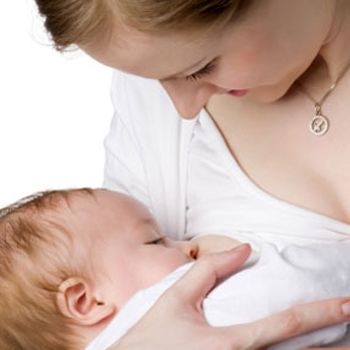When it comes to motherhood, the topic of breastfeeding is on the top of priority list. All the doctors always highlight the benefits of extended breastfeeding both for mom and the baby. Though there are already many known benefits and advantages of breastfeeding, but a new research study has certainly given it another point of prime importance. A new medical study has claimed that exclusive and extended breastfeeding bring out a real positive element as it can reduce the risk of HIV transmission from mother to baby.
Since centuries, we have heard the enormous advantages of breastfeeding, as it is widely regarded as the best form of food and nutrition for newborns. With the natural breastfeeding, mother not only transfers essential nutrients to her baby, but also transfers important immune-system factors which eventually protect the baby against potentially life-threatening infections. In spite of the fact that breastfeeding is considered as the most prioritized thing to do for the mother, there has always been a controversy about breastfeeding by HIV-infected mothers, as the virus that causes AIDS can also be transferred through breast milk. In general, it has been observed in the medical researches that there is almost 10 to 15 percent risk of HIV transmission from mother feed. However the new research shows that changes in breastfeeding routines would actually affect the HIV levels in the breast milk of infected mother. The exclusive and extended breastfeeding can make things positive and actually reduce the chances of HIV transmission through the milk.
It has been found in the study that HIV virus decreases more in the milk of infected mothers who did exclusive breastfeeding to their babies for more than four months. To give an authenticity to this new study, a proper research has been carried out by the medical practitioners. Almost 1000 HIV-infected mothers were kept under observation to confirm the findings of the study. Half of these infected mothers breastfed their babies for four months and other half fed beyond that. All of them were advised and encouraged to do exclusive breastfeeding.
At the four month mark of the study, half of the mothers were asked to stop breastfeeding while the other half continued to do extended breastfeeding. At four and a half month time, the samples of breast milk were collected from all the HIV-infected mothers who participated in the research for detail analysis. At the end of the study, it was found that among the mothers who followed extended breastfeeding for four and a half months, less than 40 percent had HIV virus present in their milk. On the other hand, among the mothers who stopped breastfeeding before the period of four months, more than 75 percent had HIV in their milk.
The interesting part of this study is the fact that there were no differences in the HIV levels in the breast milk of the participants of the two groups of women when they were tested earlier at the four month mark. However, at the mark of four and a half month it was quite evident that exclusive breastfeeding has certainly brought a positive and healthy change by decreasing the HIV concentration in the breast milk. According to the medical investigators, they have discovered the highest concentrations of HIV in the breast milk of those mothers who has stopped breastfeeding at four months. According to Dr. Kuhn, who actually played an active role in this study, the HIV concentration is also higher in the milk of those women who supplemented breastfeeding with some other nutrition.
The study clearly claims that the HIV levels in the breast milk of infected mothers can only be decreased by exclusive and extended breastfeeding. At the same time the study author Louise Kuhn also mentioned that if antiretroviral drugs are given to HIV infected mother in conjunction with extended breastfeeding, the overall risk of HIV virus transmission to the baby would become as low as one to two percent range.
While we all know the multiple benefits of breastfeeding, a new study has given it an extra plus point. The exclusive and extended breastfeeding can surprisingly lower the risk of HIV transmission from infected mother to baby.



